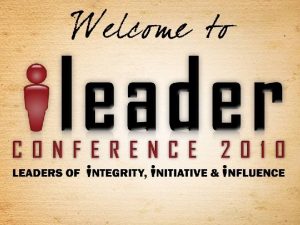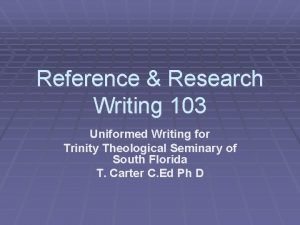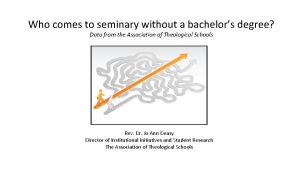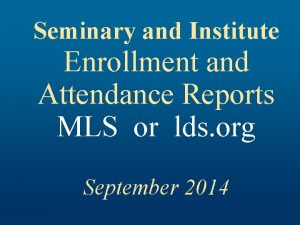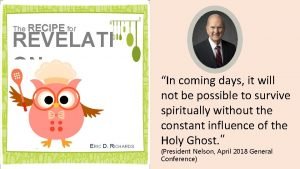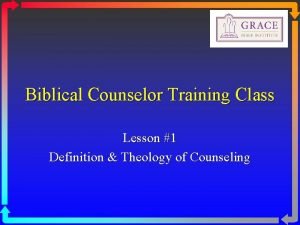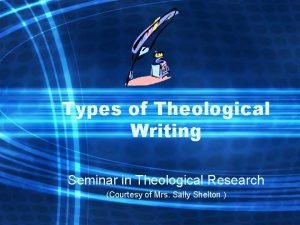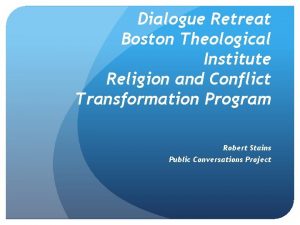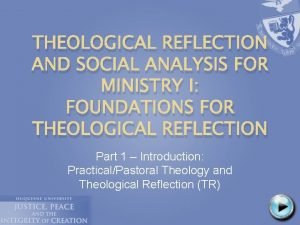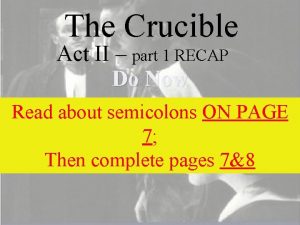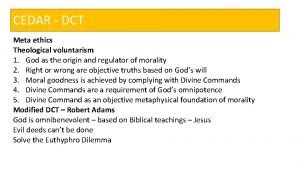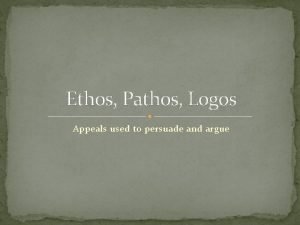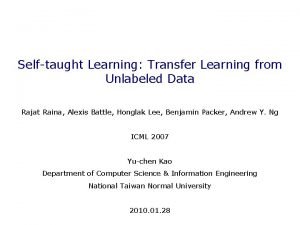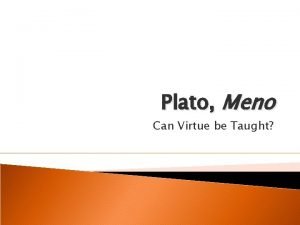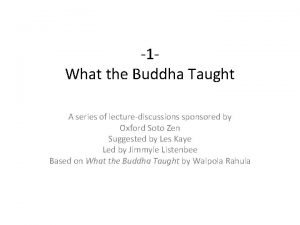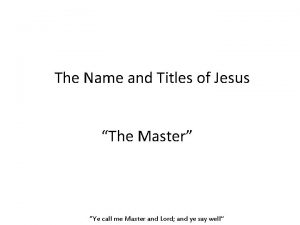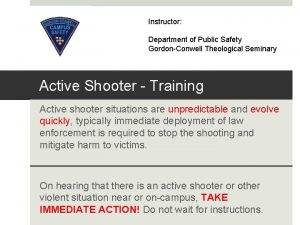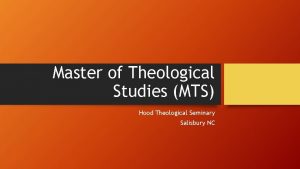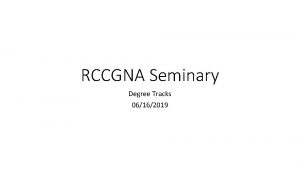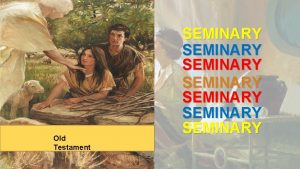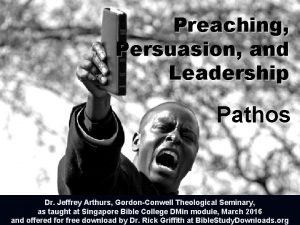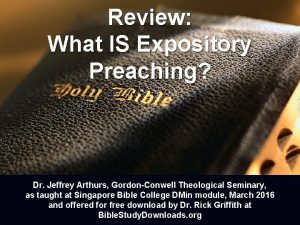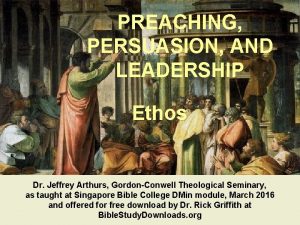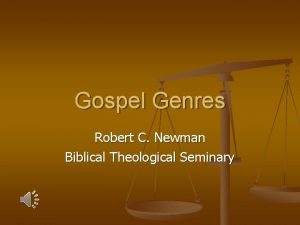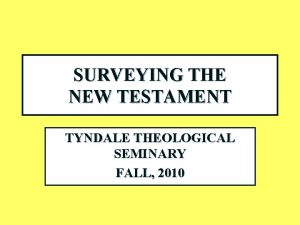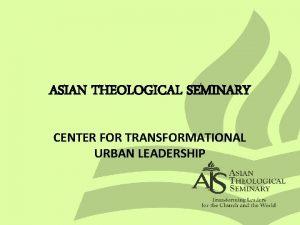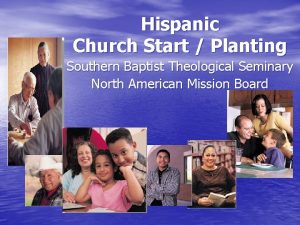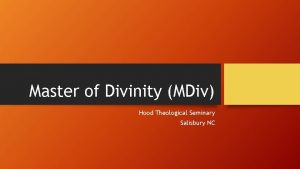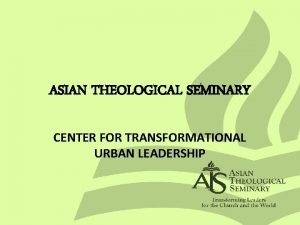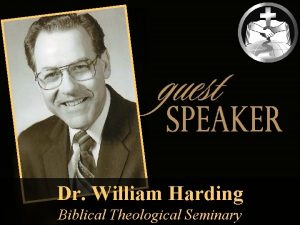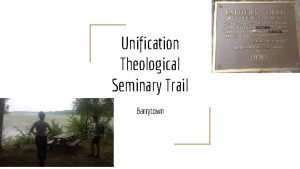Dr Jeffrey Arthurs GordonConwell Theological Seminary as taught




























- Slides: 28

Dr. Jeffrey Arthurs, Gordon-Conwell Theological Seminary, as taught at Singapore Bible College DMin module, March 2016 and offered for free download by Dr. Rick Griffith at Bible. Study. Downloads. org

Twenty-first century leaders will lead not by the authority of their position but by their ability to articulate a vision and core values for their organizations or congregations. Aubrey Malphurs Warning: Vision leaks.

�Informational Preaching �Exhortational Preaching �Prophetic Preaching �Therapeutic Preaching �Visionary Preaching

Bryan Wilkerson: “A form of expository preaching that empowers people to pursue God’s better future for their lives and churches by unleashing the transformative power of words, images, stories, and the person of the preacher. ”

Informational Exhortational Prophetic Therapeutic Visionary GOAL Understanding Action Correction Restoration Transformation VERB Know something Do something Stop something Feel something Become something KEY WORDS Know Understand Believe Affirm Must Need Should Ought Don’t Beware Avoid Stop Feel Sense Receive Enable See Imagine Can What it would look like…. TAKE-AWAY What’s True What’s needed What’s wrong What’s helpful What’s possible TONE Didactic Urgent Negative Pastoral Positive DEPRAVITY FACTOR Ignorance Apathy Disobedience Woundedness Faithlessness PREACHER’S ROLE Teacher Coach Prophet Counselor Leader

Proclaiming “why we exist” is the foundational platform for any church’s administration. Understanding the purpose of the church is not something that should be taken for granted, but should be continually communicated as a regular staple of the preaching regimen. James White, “Preaching and Administration, ” Handbook of Contemporary Preaching, Michael Duduit, ed. (Nashville: Broadman and Holman, 1992): 455 -456.

� Encourage/inspire. �“It will be worth it for you. ” �Deut. 28: 1 -14; 30: 11 -16, 19 -20.

� No one ever said thanks. � There was no training. � I never knew exactly what they wanted me to do. � No one provided leadership, so my questions never got answered. � They forgot about me after they gave me the job. � I never received the tools and resources I needed. � It wasn’t any fun. The Pastor’s Coach, www. injoy. com

� Encourage/inspire. �“It will be worth it for you. ” �Deut. 28: 1 -14; 30: 11 -16, 19 -20. � Warn. �“The wrong decision will result in pain for you. ” �Deut. 28: 15 -68, 30: 17 -18; Prov. 7: 6 -27. � Model. �“I’ll go first. ” �Josh. 24: 14 -15; 1 Chron. 29: 1 -5; John 13.

The life of the speaker has greater weight in determining whether he is obediently heard than any grandness of eloquence. Augustine, On Christian Doctrine, trans. Robertson, 164.


“Every vision needs a vision-embodier. ” Bill Hybels “You know how we lived among you for your sake. You became imitators of us and of the Lord. . . we were delighted to share with you not only the gospel of God but our lives as well. ” I Thessalonians 2: 6, 8

� Encourage/inspire. �“It will be worth it for you. ” �Deut. 28: 1 -14; 30: 11 -16, 19 -20. � Warn. �“The wrong decision will result in pain for you. ” �Deut. 28: 15 -68, 30: 17 -18; Prov. 7: 6 -27. � Model. �“I’ll go first. ” �Josh. 24: 14 -15; 1 Chron. 29: 1 -5; John 13. � Grander �“Give vision. yourself to something bigger than yourself. ” �Esther 4: 12 -14.

� To � To do the right thing. feel good about something. contribute to society. join a social group. prove themselves. enrich their lives. Guy Kawasaki, Selling the Dream (New York: Harper Collins, 1991), 53 -54.

� Concrete (not abstract) � Vivid (not dull)

I have found myself discovering that mostly I do not need more advice, but strength. I do not need new information, but the courage, freedom, and authorization to act on what I already have been given in the gospel. . The dry places in our lives— places of resistance and embrace—are not ultimately reached by instruction. . . but by stories, images, metaphors, and phrases that line out the world differently. Walter Breuggeman

� Concrete (not abstract) � Vivid (not dull) � Repeated (not spoken once then forgotten)

� Preach a “state of the church” message every year. � Preach a series on the mission of the church every year. � Summarize your vision in one memorable statement and repeat it often.

�Coin a phrase �Create a metaphor � Tell a story “The human mind is a picture gallery, not a lecture hall, and the images that hang there shape our beliefs, behaviors and decisions. ” Warren Wiersbe

Perhaps the most powerful tool for communicating the language of leadership within the preaching event is the use of stories that capture the essence of the vision. James White, “Preaching and Administration, ” Handbook of Contemporary Preaching, Michael Duduit, ed. (Nashville: B & H, 1992): 458 -459.

For there is no way in which the mind of the auditor may be aroused or soothed that I have not tried. . But, as I said before, it is no great intellectual gift [which enables me to arouse them], but a vigorous spirit which inflames me to such an extent that I am beside myself; and I am sure that the audience would never be set on fire unless the words that reached them were fiery. Cicero, Orator (Loeb Classical Library), 130.

SUCCES �Simple � Unexpected � Credible � Concrete � Emotional � Stories (Heath and Heath, Made To Stick)

Case Study: Singleton “Turtles on Fencepost” Rhetorical Situation: is this deliberative, forensic, or epideictic? Does this sermon use “SUCCES”? • Simple • Unexpected • Concrete • Credible • Emotional • Story Does the preacher coin a phrase? Comment on the preacher’s delivery. Does he embody the message?

Case Study: Bill Hybels, “Firsts” track 6 -10 (pp. 3 -5 of transcript) Does this sermon use “SUCCES”? • Simple • Unexpected • Concrete • Credible • Emotional • Story

Case Study: Andy Stanley “Together” (start at 13: 00, p. 4 of manuscript) Does this sermon use “SUCCES”? • Simple • Unexpected • Concrete • Credible • Emotional • Story Comment on Stanley’s : • Delivery. Does he embody the message? • Language. Is he direct? Does he use repetition? Is he concrete? • Transcendence. Does he ask them to give to something bigger than themselves?

Case Study: Timothy Tennent, “The Translatability of the Gospel” (start at 20: 00) • Does Tennent use concrete language and repetition? • Does he create the mood by his delivery? • How is the sermon adapted to his audience and occasion?


Get this presentation for free! Preaching (Homiletics) link at Bible. Study. Downloads. org
 Mark bailey dallas theological seminary
Mark bailey dallas theological seminary Trinity theological seminary of south florida
Trinity theological seminary of south florida Trinity theological seminary of south florida
Trinity theological seminary of south florida Is mordred arthur's son
Is mordred arthur's son Bangkok bible seminary
Bangkok bible seminary Jesus seminary
Jesus seminary Seminary without bachelors
Seminary without bachelors Ofakim seminary
Ofakim seminary Lds seminary enrollment
Lds seminary enrollment Lds seminary attendance requirements
Lds seminary attendance requirements Mentorear
Mentorear Eric d richards
Eric d richards Examples of theological virtues
Examples of theological virtues Theological pyramid
Theological pyramid Types of theological research methods
Types of theological research methods Boston theological institute
Boston theological institute Theological reflection questions
Theological reflection questions Ezekiel cheever motivation
Ezekiel cheever motivation Meta ethics vs normative ethics
Meta ethics vs normative ethics Ethos pathos logos assignment
Ethos pathos logos assignment I wish my parents would
I wish my parents would Mr sullivan teaches us grammar change the voice
Mr sullivan teaches us grammar change the voice Self-taught learning: transfer learning from unlabeled data
Self-taught learning: transfer learning from unlabeled data Plato believed in rule by ______.
Plato believed in rule by ______. Some things are caught not taught
Some things are caught not taught Whats civic virtue
Whats civic virtue What the buddha taught summary
What the buddha taught summary Daskolos
Daskolos Eversley primary school
Eversley primary school
